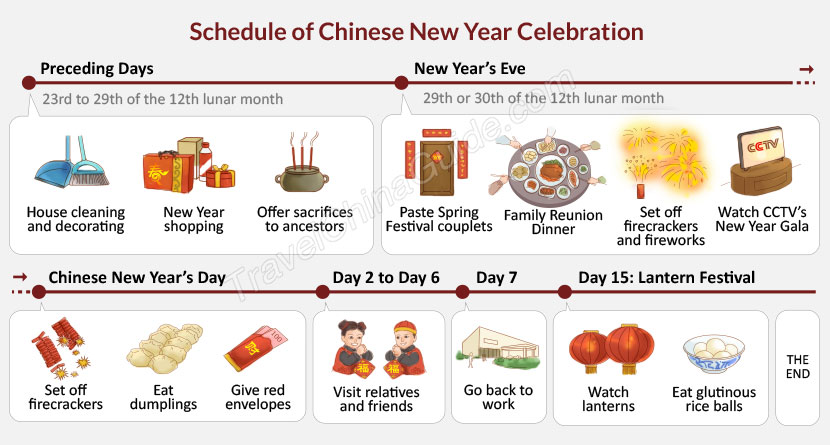Chinese New Year, the grandest festival for Chinese people, is celebrated for more than half a month. According to the oldest traditions, people follow a day-by-day schedule of Chinese New Year festivities from the 23rd day of the 12th lunar month, with specific things to do on certain days.
23rd day of 12th lunar month (Jan. 22, 2025) - Worship Kitchen God
In Chinese traditional culture, the Kitchen God will report to the Jade Emperor about the daily affairs of each family. Based on the report, the Jade Emperor will decide whether or not to reward this family. People will sacrifice candy, water, beans to the Kitchen God to flatter him, so that he can report good things about the family. As a result, the Jade Emperor may not punish the family, which can live safe and sound during the next year. On the Festival's Eve, the Kitchen God will go back to the human’s world, so he will get a warm welcome from human beings. After this sacrifice on this day, the ancestors will be worshipped by the whole family, and the sacrifice remains in place till December 30.
24th day of 12th lunar month (Jan. 23, 2025) - House Cleaning
According to the traditional schedule of Chinese New Year preparation, cleaning is done on this day. All vessels, curtains, beddings and every corner need to be cleaned, and people hope to welcome the festival in a clean environment. In Chinese, cleaning the dust means driving away the old things.
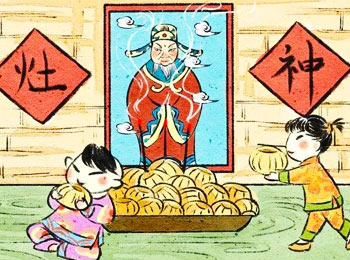 | | Worship the Kitchen God | |  | | House Cleaning | |
25th day of 12th lunar month (Jan. 24, 2025) - Make Bean Curd
In some places, bean curd will be made on this day. It is said that the Jade Emperor will come to inspect the human world to check whether the report from the Kitchen God is true. In order to testify that what the Kitchen God said is true, people eat cheap bean curd to show the Jade Emperor that they are thrifty and they live a poor life. Thus they can avoid punishment from the Jade Emperor.
26th day of 12th lunar month (Jan. 25, 2025) - Buy Meat
In ancient China, most of the common people lived a poor life and could only eat pork during this festival. So on this day, butchering pigs fed by every family or purchasing pork was the main activity; as a result, they could reserve the pork for the festival. Although modern people can eat meat in daily life, people still like to buy meat on this day to keep to the tradition.
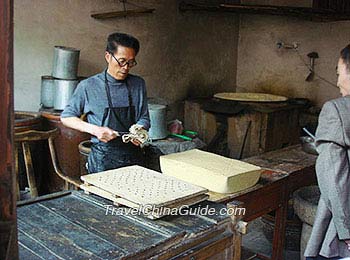 | | Make Bean Curd | | 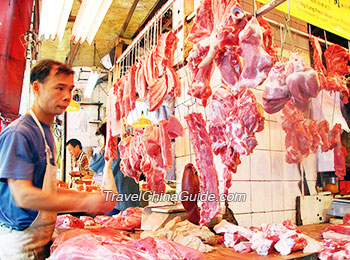 | | Go to the Butcher's | |
27th day of 12th lunar month (Jan. 26, 2025) - Shopping & Bathing
Shopping is the most important activity on this day. People will purchase fireworks, couplets, toys and so on. They also buy new clothes for the next year. In the folk custom, people will also have baths and wash all the clothes in the hope, of removing the bad luck from the previous year.
28th day of 12th lunar month (Jan. 27, 2025) - Make Steamed Bread
Making steamed breads and pasting the paper-cuts are done on this day. People will prepare the food for all the days from the starting of Chinese New Year on the 1st day of the 1st lunar month to the Lantern Festival on the 15th day, for in old times, nothing could be bought during that period. Also on this day, people will decorate the rooms by pasting paper-cuts on the windows.
Although now the supermarkets or shopping centers are still open and people can easily purchase anything during the holiday, it is still a habit for people to prepare various kinds of food before the festival, especially in the rural areas.
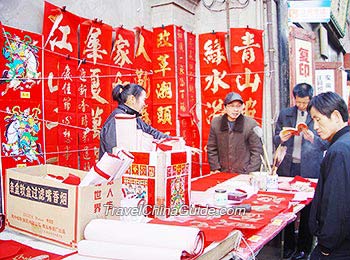 | | Shopping the Festival | | 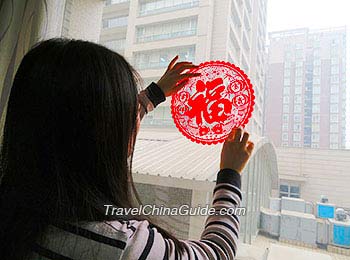 | | Paste Paper-cuts on the Window | |
29th day of 12th lunar month, 2024 (Jan. 28, 2025) - Worship Ancestors & New Year's Eve
On this day, people will worship ancestors at their tombs. This is also the most important and cheerful day. People will paste the Spring Festival couplets, Gods of Gates and New Year pictures. Even though, modern people seldom do these things in time order as ancient people did, they still keep the custom of pasting the couplets. When all couplets are pasted, the festive atmosphere will be filled in every corner in China.
The family reunion dinner, Chinese New Year TV gala and staying up all night on its Eve are also traditional festivities. Similar to the Christmas dinner in western countries, the New Year reunion dinner has significant meaning to Chinese people, because it is the time that all family members reunite together. The most important food in this dinner is the dumpling, which is very popular in the northern part of the country. Niangao and rice dumplings are eaten by people in southern part of the country. Besides, various Chinese New Year foods are served on that night such as fish, spring rolls and so on. At midnight, many places will strike bells to pray for the next smooth year, and people will set off fireworks.
 | | Spring Festival Couplets | | 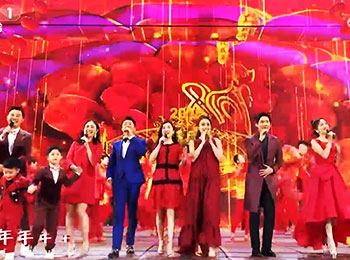 | | CCTV New Year's Gala | |
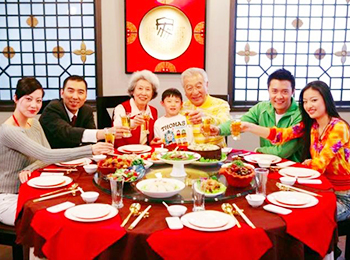 | | Family Reunion Dinner | | 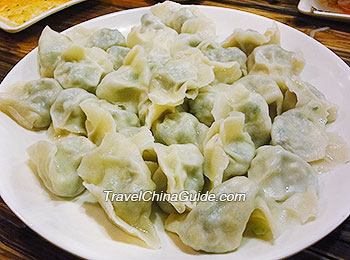 | | Dumplings | |
1st day of 1st lunar month - Chinese New Year (Jan. 29, 2025)
Setting off firecrackers to chase off bad spirits is the first thing to do after people get up on the first day. After the firecrackers, it is time for the first meal of the year, which is as important as the reunion dinner for most Chinese people. Most people choose to eat dumplings, in hope of making fortune in the future, because the shape of the dumpling is similar to the gold ingots used as currency in ancient time. People in Fujian prefer to eat noodles, because the noodle is the symbol of longevity in local culture.
After the meal, it is the happiest time for the younger generations, because they can get red envelopes from the older generations. The first day is also a time to pay a New Year’s visit as well as send blessing to the senior members of extended families and other relatives. Now the methods of sending blessing are changing and many through text messages and e-mails, as well as phone calls.
 | | Visit Relatives | | 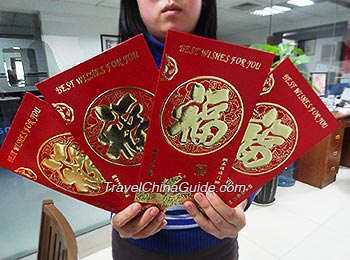 | | Red Envelopes | |
2nd day of 1st lunar month (Jan. 30, 2025) - Worship God of Wealth
According to the Chinese New Year schedule, people will worship the God of Wealth on this day. It is also the time for married daughters to visit their birth parents and relatives, because in daily life in ancient China they could not go back to their birth families. Even though daughters now can go to visit their birth parents at any time, this custom remains.
3rd day of 1st lunar month (Jan. 31, 2025) - Stay at Home
This day is also called Goat Day, on which people cannot kill the sheep or goats. In southern China, people think quarrels can easily happen, so they do not visit each other on this day.
5th day of 1st lunar month (Feb. 2, 2025) - Eat Dumplings
According to the day-by-day schedule of Chinese New Year festivities, this day is called Po Wu, on which people will eat dumplings and set off firecrackers.
7th day of 1st lunar month (Feb. 4, 2025) - Birthday of Human
In Chinese mythology mankind was created on this day, so this day is the birthday of humanity. On this day, people will use seven kinds of vegetables and rice to make porridge in celebrating their birthday.
15th day of 1st lunar month (Feb. 12, 2025) - Lantern Festival
The 15th day, also referred to Lantern Festival, is the end of the Chinese New Year festivities and all things are back to normal after that day. It is also the first full moon day after the grand event. On this day, people will go to enjoy different shapes of lanterns and guess lantern riddles.
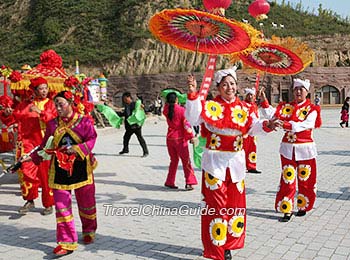 | | Shehuo Parade | | 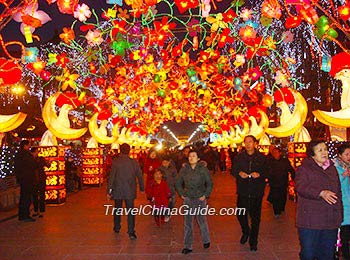 | | Xi'an City Wall Lantern Show | |
In some areas in northern part of the country, Shehuo is another festivity which can be seen and it attracts many people to participate and enjoy. This is a costume parade which includes different kinds of performance such as lion dance, yangko dance, land boat shows and so on. The parade is warmly welcomed by the local people.
Rice dumplings, sweet glutinous rice balls, are eaten on this day. The rice dumpling, traced back to the Song Dynasty (960-1279), has a meaning of reunion in Chinese custom and belief.
- Last updated on Sep. 24, 2024 by Gabby Li -
